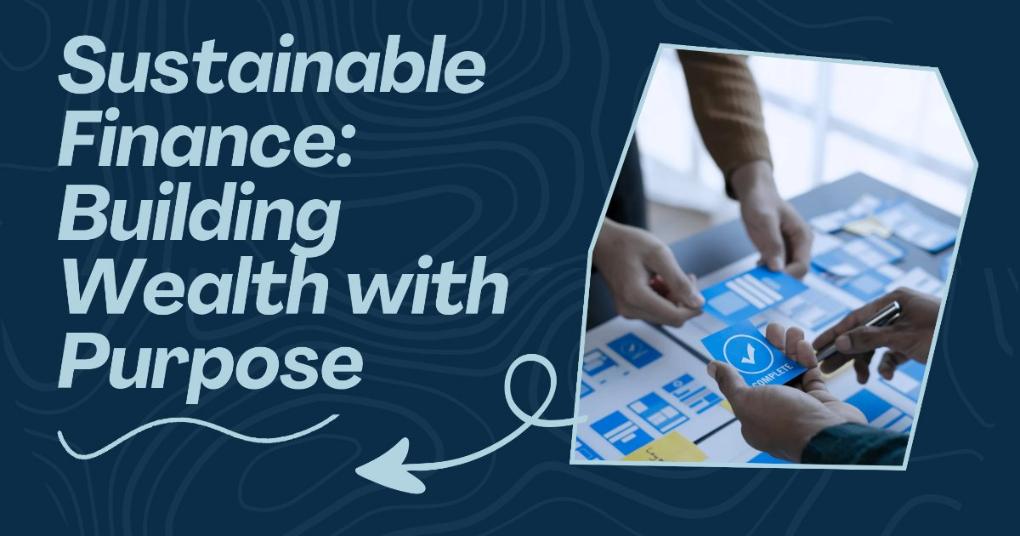Sustainable Finance: Building Wealth with Purpose
Explore how sustainable finance is transforming global wealth-building in 2025. Learn about ESG investing, impact strategies, and how purpose-driven finance compares to traditional investments.
Introduction
Finance has always been the driving force behind economies, shaping the way individuals, corporations, and governments allocate resources. But as the 21st century progresses, money is no longer just about returns—it is about responsibility. The financial sector is undergoing a powerful transformation toward sustainable finance, a system where wealth creation aligns with environmental protection, social justice, and ethical governance.
In 2025, sustainable finance is no longer a niche—it is mainstream. Global investors are demanding that their money supports both profit and purpose. According to Bloomberg Intelligence, ESG (Environmental, Social, Governance) assets are projected to surpass $50 trillion by 2025, representing more than one-third of global assets under management. But what does this mean for investors? How does sustainable finance compare to traditional finance? And more importantly, how can you build wealth with purpose while securing long-term financial stability?
This blog will explore these questions through an in-depth comparative analysis, drawing on authentic facts, recent data, and global trends.
What is Sustainable Finance?
Sustainable finance refers to financial practices that consider environmental, social, and governance (ESG) factors in decision-making. Unlike traditional finance, which focuses primarily on profitability, sustainable finance integrates:
🌱 Environmental impact: carbon footprint, renewable energy, resource conservation.
👥 Social impact: labor rights, diversity, human well-being.
🏛️ Governance: corporate ethics, transparency, accountability.
The goal is to direct capital toward projects and companies that generate positive societal impact while ensuring financial growth.
Comparative Analysis: Traditional vs. Sustainable Finance
Factor Traditional Finance Sustainable Finance
Primary Goal Maximize short-term profit Balance profit with social & environmental impact. Risk Management Focuses on market & credit risks Considers climate risk, social unrest,governance failures. Return on Investment (ROI)Often higher in short-term, volatile Competitive long-term, lower risk from ESG scandals. Transparency Limited disclosure High reporting on ESG factors. Market Outlook Stable but slow to adapt Fast-growing, projected $50T AUM by 2025 Key takeaway: Sustainable finance is not about sacrificing profits—it is about building resilient, long-term wealth with fewer reputational and regulatory risks.
Growth of Sustainable Finance: Global Trends 2024–2025
1. Explosive Market Growth
ESG assets are expected to exceed $50 trillion in 2025, up from $35 trillion in 2020 (Bloomberg). Over 90% of S&P 500 companies now publish ESG reports.
2. Rise of Green Bonds
Green bonds (debt issued for eco-friendly projects) hit $1.5 trillion cumulative issuance in 2024. The EU accounts for nearly 50% of global green bond sales.
3. Millennial & Gen Z Demand
A Morgan Stanley survey revealed 85% of Millennials are interested in sustainable investing. Gen Z investors rank climate change as their top concern.
4. Corporate Responsibility
70% of Fortune 500 CEOs say ESG goals are now tied directly to their corporate strategy.
Why Sustainable Finance Matters for Wealth Building
1. Long-Term Stability
Traditional investments often chase quarterly profits, but sustainable finance favors long-term resilience. For example, companies investing in renewable energy are less vulnerable to oil price shocks.
2. Competitive Returns
Contrary to the myth, sustainable funds often perform as well or better than traditional funds. A 2024 MSCI study showed ESG funds outperformed non-ESG funds by an average of 1.5% annually over the last 5 years.
3. Risk Mitigation
Companies with poor ESG records face lawsuits, reputational damage, and regulatory fines. For instance, Volkswagen’s emissions scandal cost over $30 billion—a risk ESG-focused investors avoided.
4. Attracting Young Investors
With Gen Z entering the workforce, companies that adopt ESG practices attract both capital and talent. This ensures future growth and brand loyalty.
Case Studies: Sustainable Finance in Action
🌍 Case Study 1: BlackRock
BlackRock, the world’s largest asset manager, shifted its strategy in 2024 by pushing clients toward climate-conscious funds. Today, it manages more than $2.5 trillion in ESG assets, reshaping global finance.
🌞 Case Study 2: Tesla & Renewable Energy
Tesla’s rise in both market capitalization ($780B in 2025) and ESG scores shows how innovation + sustainability can attract both investors and consumers.
🌱 Case Study 3: Unilever
Unilever integrates sustainability into its core business strategy, cutting waste, reducing carbon emissions, and increasing profitability. Sustainable brands accounted for 56% of company growth in 2024.
Challenges of Sustainable Finance
While sustainable finance is growing rapidly, it faces real challenges:
1. Greenwashing – Some companies falsely market themselves as eco-friendly.
2. Lack of Standardization – ESG ratings vary between agencies, making it hard to compare.
3. Data Transparency – Many companies still fail to disclose detailed ESG metrics.
4. Initial Costs – Shifting to sustainable practices can require high upfront investment.
The Future of Sustainable Finance
AI & Big Data in ESG: Advanced analytics will make ESG measurement more reliable. Government Regulations: The EU’s Sustainable Finance Disclosure Regulation (SFDR) and the U.S. SEC’s climate disclosure rules are forcing transparency. Integration into Everyday Banking: Sustainable credit cards, green mortgages, and ESG pension funds will become the norm. Developing Economies: Countries like India and Brazil are set to lead in renewable energy financing. By 2030, sustainable finance could become the default standard rather than the alternative.
How Investors Can Build Wealth with Purpose
1. Invest in ESG Funds – Choose ETFs and mutual funds ranked high in sustainability.
2. Buy Green Bonds – Safe, fixed-income securities tied to eco-projects.
3. Support Impact Startups – Many fintech startups are disrupting industries with sustainable models.
4. Diversify Globally – Sustainable projects in emerging markets (solar farms in Africa, wind energy in Asia) offer growth potential.
5. Avoid Greenwashing – Use credible ESG rating agencies (MSCI, Sustainalytics, Morningstar).
Conclusion
Sustainable finance is not a passing trend—it is the future of wealth creation. By integrating environmental, social, and governance principles, investors can achieve competitive returns, long-term security, and meaningful societal impact. The message is clear: wealth without purpose is incomplete. In the coming years, the most successful investors will be those who align their portfolios with both profitability and sustainability.
